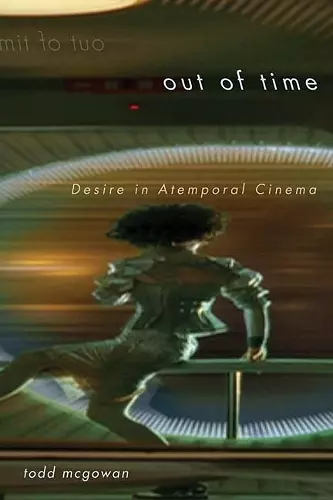Out of Time
Desire in Atemporal Cinema
Format:Hardback
Publisher:University of Minnesota Press
Published:16th Feb '11
Currently unavailable, and unfortunately no date known when it will be back
This hardback is available in another edition too:
- Paperback£23.99(9780816669967)

In Out of Time, Todd McGowan takes as his starting point the emergence of a temporal aesthetic in cinema that arose in response to the digital era. Linking developments in cinema to current debates within philosophy, McGowan claims that films that change the viewer’s relation to time constitute a new cinematic mode: atemporal cinema.
In atemporal cinema, formal distortions of time introduce spectators to an alternative way of experiencing existence in time—or, more exactly, a way of experiencing existence out of time. McGowan draws on contemporary psychoanalysis, particularly Jacques Lacan, to argue that atemporal cinema unfolds according to the logic of the psychoanalytic notion of the drive rather than that of desire, which has conventionally been the guiding concept of psychoanalytic film studies.
Despite their thematic diversity, these films distort chronological time with a shared motivation: to reveal the logic of repetition. Like psychoanalysis, McGowan contends, the atemporal mode locates enjoyment in the embrace of repetition rather than in the search for the new and different.
"With its unique mixture of detailed apercus and large synthetic visions, Todd McGowan’s new book will finally establish him as the leading US cinema theorist. Out of Time elicits in me as a fellow writer not only admiration but envy—why didn’t I write that? How could I have missed that point? But my envy is mixed with hope: with writers like McGowan, the future of cinema studies is safe!" —Slavoj Zizek
"Todd McGowan theorizes a recent moment in film history when the question of temporality is reformulated in new and unexpected ways. He describes these ‘atemporal’ films through a sequence of astonishingly brilliant readings, guided by his strong, clear grasp of psychoanalytic theory, in an account of an important trend in contemporary cinema. Moreover, McGowan’s analysis opens up fundamental questions concerning the relationship of art and temporality more generally, and as such will be of compelling interest to a wide range of philosophers, critical theorists, and art critics." —Kenneth Reinhard, UCLA
ISBN: 9780816669950
Dimensions: 216mm x 140mm x 23mm
Weight: unknown
296 pages